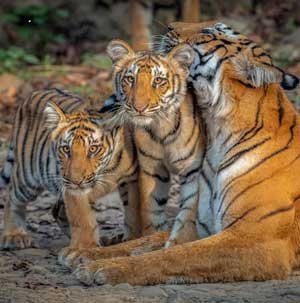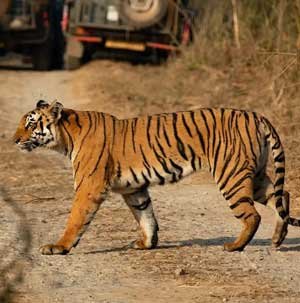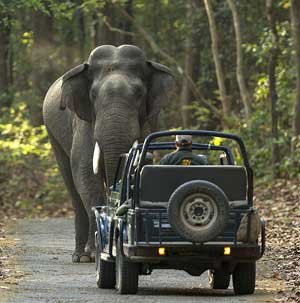
The Jhirna Safari Zone is a part of the Jim Corbett National Park in Uttarakhand, India. It is one of the primary zones in Corbett National Park, and it's known for offering a unique safari experience with a chance to spot various wildlife species, including tigers, elephants, and other fauna native to the region. Here's a full description of the Jhirna Safari :
Overview
Location : Southern part of Jim Corbett National Park, near Dhela and Ramnagar (approx. 16 km from Ramnagar town).
Established : Opened to visitors in 1994 after the relocation of Jhirna village from inside the park area.
Zone Type : Eco-tourism zone within the buffer area of Corbett Tiger Reserve.
Famous For : Easy wildlife visibility, especially sloth bears, elephants, deer, and tigers; scenic landscape and birdwatching opportunities.
Accessibility : It is the only zone in Corbett that remains open year-round, even during the monsoon (subject to road conditions).
Why Visit Jhirna
Year-Round Access : Unlike many zones in Corbett that close during monsoon season, Jhirna is open throughout the year (weather/road conditions permitting).
Good wildlife-viewing opportunities : Because of the grassland + open terrain combination, it offers good chances to spot herbivores (nilgai, deer, sambhar), elephants, sloth bears, and even tigers.
Less dense forest than some other zones : The open chaurs and stream beds allow better visibility for safari.
Birding : The varied terrain and water‐streams make it favourable for bird watchers.
Safari Experience
Safari Shifts & Number of Jeeps : Two shifts per day; each shift has a cap on number of jeeps (approx 30 jeeps per shift) in Jhirna.
Capacity of Jeep : Typically max 6 adults + 2 children (under 12) in one jeep permitted.
Entry Gate : Dhela Gate (for Jhirna zone) – around ~15 km from Ramnagar (some sources say 15 km, some say 18 km) depending on route.
Safari Duration : Safaris typically last around 3–4 hours, depending on the route, wildlife sightings, and weather conditions.
Safari Types : Visitors can experience both jeep safaris and canter safaris in the Jhirna Zone. Jeep safaris are more exclusive and allow for smaller groups, while canter safaris can accommodate larger groups.
Wildlife Sightings : Jhirna Safari Zone is famous for its rich diversity of flora and fauna. While it offers good opportunities to spot tigers, it's also known for sightings of sloth bears, leopards, wild boars, and elephants. Various species of deer (like sambar and chital) are commonly seen, along with a variety of birds, including hornbills, peacocks, and kingfishers.
Open Period : “Throughout the year subject to weather/road conditions.” Note: during monsoon (July-Sept) advance booking might not be accepted; permits may be issued on day-of.
Booking : Need to obtain permit from forest authorities + hire safari vehicle + certified naturalist/guide.
Best Time to Visit
Season : The safari zone remains open from November to June, with the monsoon season (July to September) being a time when the park is generally closed to tourists.
Time : The months of November to March are considered ideal for visiting as the weather is cool and comfortable. In the summer months (April to June), the weather can get hot, but this is also when animals tend to gather around waterholes, making it an excellent time for sightings.
Flora
The landscape of the Jhirna Safari Zone is varied, ranging from sal forests, grasslands, and riverine belts. The region is characterized by a mix of tropical deciduous and semi-evergreen forests, which are rich in plant species that support a diverse ecosystem.
Key Wildlife Species
Tigers : Jhirna is one of the zones where tiger sightings are relatively frequent. The presence of tigers, though not guaranteed, makes it a thrilling experience for wildlife enthusiasts.
Elephants : The area is home to both wild elephants and herds that pass through during certain times of the year.
Leopards : While harder to spot, leopards also roam the region, adding to the allure of the zone.
Sloth Bears : The Jhirna zone is one of the best places to spot sloth bears in Corbett, especially at night or during early morning safaris.
Deer Species : Jhirna is home to Sambar deer, Chital (spotted deer), and Nilgai (blue bull), which are often seen grazing on the grasslands.
Natural Attractions
Rivers and Waterholes : The Jhirna zone has several small rivers and waterholes where wildlife comes to drink, particularly during the dry months. These areas are prime spots for sightings of various animals, especially in the summer.
Grasslands and Meadows : The large expanses of grasslands in Jhirna are an important habitat for herbivores like deer and wild boar, which in turn attract predators like tigers and leopards.
Booking & Regulations
Entry Tickets : Safari bookings for the Jhirna Zone can be made online through the official website of Corbett National Park or via authorized agents. There are limited slots available per day, and the park authorities ensure that safaris are conducted in an eco-friendly manner.
Permits : Visitors need to obtain safari permits which are issued based on availability. These permits are issued in advance, especially during peak tourist seasons.
Guides : Experienced naturalists or guides are available for safari tours, providing valuable insights into the park's ecology and helping spot wildlife.
Accommodation Options
In the Park : There are several government-run and private lodges near the Jhirna Safari Zone, including Forest Rest Houses, which offer basic amenities for those looking to stay inside or near the park.
Outside the Park : There are also numerous hotels, resorts, and guesthouses in Ramnagar, which is about 12 km away from Jhirna, offering more luxurious accommodation.
Conservation Efforts
- The Jhirna zone, like other parts of Jim Corbett National Park, plays a significant role in the conservation of wildlife, particularly the Royal Bengal Tiger, which is the park's most famous resident.
- The park is part of the Corbett Tiger Reserve and works actively on tiger conservation efforts, anti-poaching measures, and wildlife monitoring.
Nearby Attractions
Corbett Waterfall : Located close to the Jhirna zone, this scenic waterfall is a popular spot for visitors.
Garjiya Devi Temple : Situated near the Kosi river, this temple is an important religious site and offers picturesque views of the surrounding landscape.



